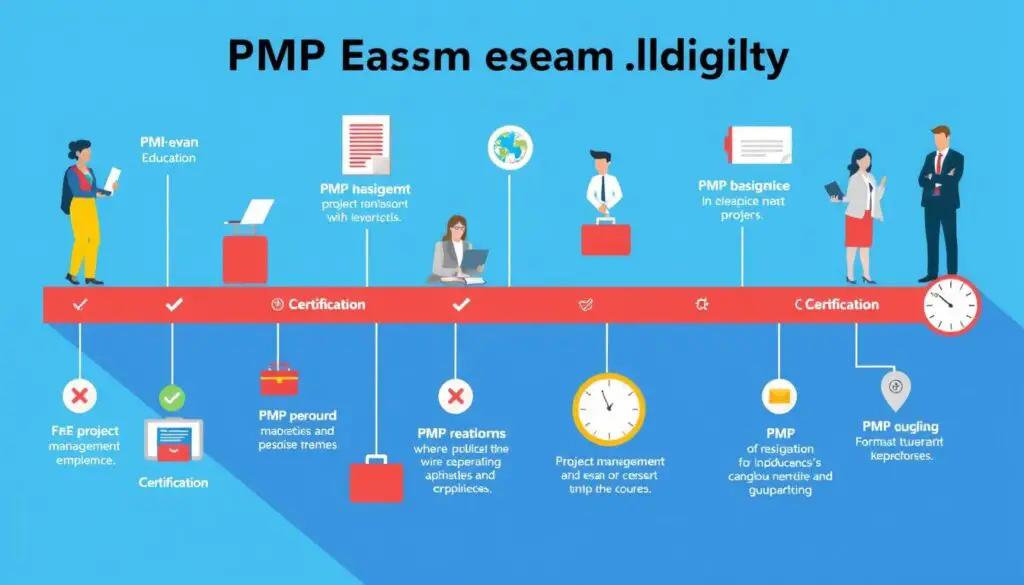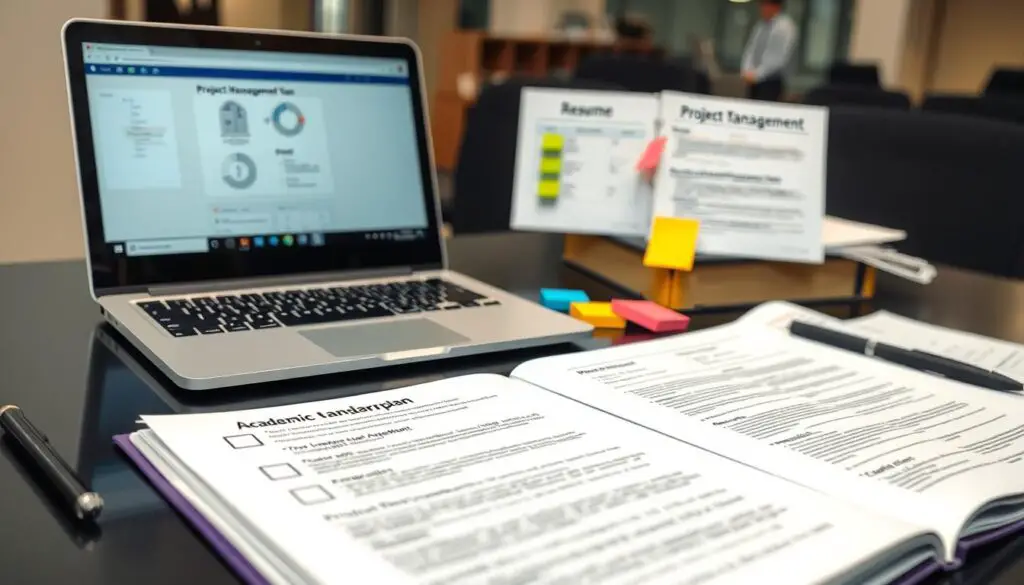To succeed in the PMP certification, knowing the 7 Essential PMP Exam Requirements You Need to Know is key. This certification, run by the Project Management Institute (PMI), shows you’re skilled in project management. It’s recognized worldwide. You’ll need to understand the PMP certification requirements like education, experience, and how to apply.
The PMP exam has 200 multiple-choice questions to be finished in four hours. With a pass rate of just 61%, it’s clear you need to study well. This guide will help you know what you need for a successful PMP certification. By learning these PMP exam essentials, you can prepare better for the exam.
Understanding PMP Certification Requirements
The Project Management Institute (PMI)® has set clear PMP certification requirements. Knowing these Project Management Professional prerequisites well can boost your success chances. You need to show three to five years of unique project management experience.
For those with a high school diploma or associate degree, 60 months of experience is required. Those with a bachelor’s degree need 36 months, and GAC-accredited degree holders need 24 months.
You also need 35 hours of formal project management education before the exam. This can be done through online courses and workshops. It’s important to understand a wide range of topics, like integration and risk management.
Plan to study for 10-12 weeks to be well-prepared. Studying one to two hours daily is beneficial. Adding breaks and fun activities to your study plan can help reduce stress and keep you motivated. Taking several practice exams can help you know if you’re ready for the real exam.
Eligibility Criteria for the PMP Exam
To take the PMP exam, you must meet strict rules set by the Project Management Institute (PMI). These rules depend on your education. Here are the main paths:
- If you have a four-year degree, you need 36 months of leading projects and 4,500 hours directing them.
- Without a degree, you need 60 months of leading projects and 7,500 hours directing them.
Also, you must finish at least 35 hours of project management education. This is key for the exam, which has 180 questions to answer in 230 minutes.
About 25% of those who pass have an IT background, and 30% are from engineering. This shows that PMPs come from many fields.
There’s a big need for project management experts, growing by 33% by 2027. Getting PMP certified can really help your career. Around 61% of certified people make more than non-certified ones.

Knowing these rules is key when applying. Make sure to count your project management hours correctly. Only hours from the last eight years count. Following these steps can greatly improve your chances of getting PMP certified.
7 Essential PMP Exam Requirements You Need to Know: A Guide
To get your PMP certification, you must know the key requirements. Here are the main points to focus on for your exam prep:
- Project Management Experience: You need a certain amount of project management experience. This is 36 months (3 years) if you have a four-year degree. If you only have a secondary education, it’s 60 months (5 years).
- Project Management Education: You must complete 35 hours of project management education. This education must meet PMI’s Registered Education Provider (R.E.P.) standards.
- Documentation: Make sure your application is detailed and accurate. Good documentation boosts your credibility.
- Study Materials: Use the PMBOK® Guide and other resources like PMI Study Hall. They help you understand the exam better.
- Study Plan: Plan out your study schedule. This helps you stay on track and cover all the topics.
- Practice Exams: Practice with mock exams to check your knowledge. It’s recommended to do at least five full-length exams.
- Application Process Familiarity: Knowing the PMP application process helps you register on time and complete all steps.
Getting ready for the PMP exam means knowing it has 180 questions to be done in 230 minutes. Understanding these requirements will help you feel more ready for your exam day.

| Requirement | Details |
|---|---|
| Project Management Experience | 36 months for degree holders, 60 months for secondary education. |
| Project Management Education | 35 hours of qualifying project management training. |
| Documentation | Comprehensive application verifying experience and education. |
| Study Materials | PMBOK® Guide and additional study resources. |
| Study Plan | Create a structured and effective study schedule. |
| Practice Exams | Completion of at least five full-length mock exams. |
| Application Process | Understand and follow the application steps carefully. |
Step-by-Step PMP Application Process
The PMP application process can seem daunting, but breaking it down helps. Knowing what documents you need is key for a smooth application. There are two main areas to focus on: gathering the right documents and verifying your experience.
Gathering Required Documentation
To start, you need to collect documents that show your project management skills and education. You’ll need:
- Degree certificates
- Project management training certificates
- Detailed records of your project management hours
- Any other supportive documentation that demonstrates your qualifications
For those looking for project management courses, online options can help. You need 35 hours of training. This is a must for your application.
Understanding Experience Verification
Verifying your project management experience is vital. You should document:
- Your role and responsibilities
- The outcomes achieved through your leadership
- The duration of each project
PMI might randomly check some applications. If you’re chosen, you’ll need to provide more documents. So, make sure your documentation is thorough.

| Degree Type | Experience Required | Hours Leading/Directing Projects |
|---|---|---|
| High School Diploma or Secondary Degree | 60 months | 7,500 hours |
| Bachelor’s Degree | 36 months | 4,500 hours |
Understanding these steps and requirements will help you succeed in the PMP application. Good preparation increases your chances of approval and success on the exam.
PMP Exam Preparation Guide
Getting ready for the PMP exam needs a smart plan. You must cover all key materials and use your time wisely. Having a clear study plan helps you understand project management better.
Creating a Study Schedule
Set aside 10-12 weeks for the best prep. Aim for regular study times. A good study plan might look like this:
- Study for 35-40 hours a week.
- Do study sessions of 25-50 minutes, then take 5-10 minute breaks.
- Use practice exams to get used to the real test.
- Set daily goals and check your progress often.
- Take breaks to help you remember and understand better.
Identifying Study Materials
Picking the right study materials is key. You need to understand and prepare well. Here are some top picks:
- The PMBOK® Guide is vital for 70-80% of the exam.
- Exam prep books offer lots of practice questions.
- Online courses fit different learning styles.
- PMP podcasts share tips from experts.
- Flashcards help you learn key terms and formulas.
Using different resources helps you learn in your own way. It makes understanding project management easier.

Effective Study Strategies for the PMP Exam
To pass the PMP exam, use effective study strategies. Break your study into manageable parts. Short, focused sessions help you remember better, so aim for 60-90 minutes on reading days and 90 minutes on practice days. This keeps your study consistent and prevents burnout.
Using different PMP exam study techniques helps a lot. Practice exams get you used to the question style. They show your strong points and what you need to work on. Try to do mock exams weekly, like on Fridays, and review on Saturdays. This can boost your score by 20-40%.
Being part of a study group is also great. It offers a chance to learn from others and stay motivated. Plus, flashcards are perfect for remembering key terms and processes.
Having a study plan is key. Aim for 150-200 hours of study. Read the PMBOK® Guide twice, using the 6th Edition. Good time management during the exam, about 1.2 minutes per question, can lead to success.
| Study Strategy | Description | Expected Improvement |
|---|---|---|
| Segmented Study Sessions | Focus on 60-90 minute sessions for reading; 90 minutes for practice. | Enhanced retention |
| Practice Exams | Familiarize with question formats and identify knowledge gaps. | 20-40% performance increase |
| Study Groups | Collaborate with peers for shared learning experiences. | Deeper material understanding |
| PMP Exam Simulators | Simulate exam conditions to enhance familiarity. | 30% increase in pass rates |
| Comprehensive Study Plan | Allocate 150-200 hours effectively across materials. | Structured retention improvement |
By using these effective study strategies for the PMP exam, you’re well-prepared. You’ll have the knowledge and confidence you need on exam day.
PMP Exam Details You Should Know
Knowing the PMP exam details is key to passing. This certification is a top mark for project management skills. Understanding the exam format and structure helps you do well.
Format and Structure of the Exam
The PMP exam has 180 questions to test your project management skills. You have 230 minutes to finish, which is about 1.3 minutes per question. The questions are divided into three main areas: People, Process, and Business Environment.
Important topics include Project Integration Management, Scope Management, and Cost Management. These areas have specific processes for project success. The exam is based on five process groups:
- Initiating
- Planning
- Executing
- Monitoring and Controlling
- Closing
The exam mostly uses multiple-choice questions. It also has situational questions that mimic real projects. To prepare well, you can:
- Set daily and weekly study goals
- Use special study resources
- Join study groups or online forums
Here’s a table to help you understand the exam better:
| Component | Details |
|---|---|
| Total Questions | 180 |
| Scored Questions | 175 |
| Unscored Pretest Questions | 5 |
| Exam Duration | 230 minutes |
| Breaks | Two 10-minute breaks after completing questions 1-60 and 121-180 |
| Content Coverage | 42% People, 50% Process, 8% Business Environment |
Conclusion
Becoming PMP certified is a big deal. It needs you to know the key PMP exam requirements. This guide has given you a detailed look at the process, who can take it, and what the exam covers. With the right study tips and knowledge of the exam format, you’ll feel ready to take on the challenge.
The PMP certification is seen as the top in project management. It can lead to better job chances and even higher pay, up to 25% more than those without it. By keeping up with the PMBOK Guide’s updates and sticking to a study plan, you’ll be ahead in project management skills.
Your dedication to meeting PMP certification needs and learning key project management skills is key. As project management changes, staying updated with education and experience is vital. Start this journey and aim for excellence in project management.
Source Links
- How to Get a PMP Certification: Full Guide & Requirements
- How to Prepare for the PMP Exam Part 4: Essential Study Materials
- The 7 Things You Need to Pass The PMP® Certification Exam
- How to Get a PMP Certification
- How to Get a PMP Certification: An Overview
- PMP Exam Eligibility: A Complete Guide 2025
- PMP Certification Requirements: Full Eligibility Details
- Your 7-Step Preparation Guide for PMP Certification
- The Complete PMP Certification Guide | Project Management Academy
- PMP Certification Requirements in 2024: Here’s What You Need to Know
- How to Successfully Complete Your PMP Application
- How to Apply for the PMP® Exam in 12 Easy Steps
- Simple Steps to Earning the PMP Certification
- Top 7 Tips for PMP Exam Preparation
- PMP exam prep 2024: Essential study resources
- Invensis Learning
- How to Study for the PMP Exam: Your Guide to Passing
- PMP Exam Tips – Strategies for Effective Preparation!
- 7 Key Components of the PMP Exam Outline Every PM Should Know
- What to Know for PMP Exam? Complete Guide For 2024: PMI Outlines, Passing Score, Fees, Prep, Practice Questions & Certification Training
- Preparing for the PMI PMP Exam: A Comprehensive Guide
- The Ultimate Guide to PMBOK Guide and PMP Certification
- PMP Certification: Everything You Need to Know – PassionIT Group




